Search Results
Showing results 41 to 60 of 72
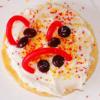
Edible Model of the Sun
Source Institutions
In this activity, learners make "solar cookies," edible models of the Sun's outer layers using sugar cookies and toppings.
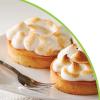
Bake Ice Cream in Your Oven
Source Institutions
In this a hands-on activity, learners explore how to put ice cream in an oven without it melting. Ideas in this activity include insulation and cooking.
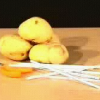
Potato Straw
Source Institutions
In this physics demonstration, learners are challenged to insert a straw the furthest into a potato.

Chocolate (Sea Floor) Lava
Source Institutions
In this edible experiment, learners pour "Magic Shell" chocolate into a glass of cold water. They'll observe as pillow shaped structures form, which resemble lavas on the sea floor.
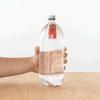
Condiment Diver
Source Institutions
In this hands-on activity, learners make the world's simplest Cartesian diver, using only a plastic bottle, some water, and a condiment packet.
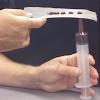
Hot Sauce Hot Spots
Source Institutions
In this activity, learners model hot spot island formation, orientation and progression with condiments.
Breakfast Sweets
Source Institutions
In this math activity, learners guess which cereals contain the most sugar. Learners use the nutrition labels on the cereal boxes to find the cereal with the least amount of sugar.
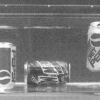
Sink or Swim?
Source Institutions
Learners observe a tank of water containing cans of diet and regular sodas. The diet sodas float and the regular sodas sink. All the cans contain the same amount of liquid and the same amount of air.
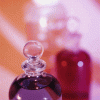
How Sweet It Is
Source Institutions
In this activity (4th activity on the page), learners use their sense of smell to rate and arrange containers filled with different dilutions of a scent (like cologne or fruit juice) in order from wea
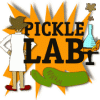
Pickle Lab
Source Institutions
In this online activity, learners experience the thrill of pickle making, and explore how a cucumber becomes a pickle.
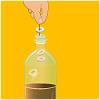
Soda Explosion
Source Institutions
This hands-on activity lets participant explore chemical reactions as they create a soda explosion with lots of bubbles. The bubbles in soda are made of carbon dioxide gas.
Transparent Gelatin
Source Institutions
In this optics activity, learners explore how they can make gelatin stop light, but not stop them from seeing fruit suspended within.

Cauldron Bubbles
Source Institutions
In this activity, learners mix up a bubbly brew and examine density. Learners explore how they can make different materials fall and rise in water using oil, water, and salt.
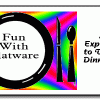
Fun with Flatware: Little Experiments to Try at the Dinner Table
Source Institutions
This is a series of three quick science activities to do with a spoon, knife, and fork. In the first two activities, learners use the flatware to explore optics, mirrors, reflection, and distortion.
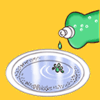
Pepper Scatter
Source Institutions
In this quick activity, learners break the tension that happens when water develops a "skin." Learners use water, pepper and some soap to discover the wonders of surface tension—the force that attract
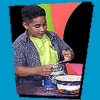
Super Sounding Drum
Source Institutions
In this activity, learners construct drums out of everyday containers (like bowls or food containers) and shrink wrap. Learners use a hair dryer to affix and tighten the shrink wrap to the container.
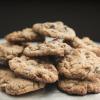
Bake Sale
Source Institutions
This activity helps learners learn about math through a real-world scenario. Three friends are baking cookies for their school’s bake sale.
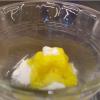
Fizzy Fun
Source Institutions
In this activity, learners test what happens when they put baking power on different frozen liquids.
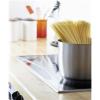
Dancing Spaghetti
Source Institutions
In this chemistry activity, learners use spaghetti to explore density and chemical reactions.
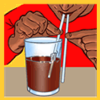
Stadium Seat Science
Source Institutions
Take the two-straw challenge and discover how pressure affects vacuums! In this activity, learners experiment with drinking through one and two straws, comparing the amount of liquid they can drink.
